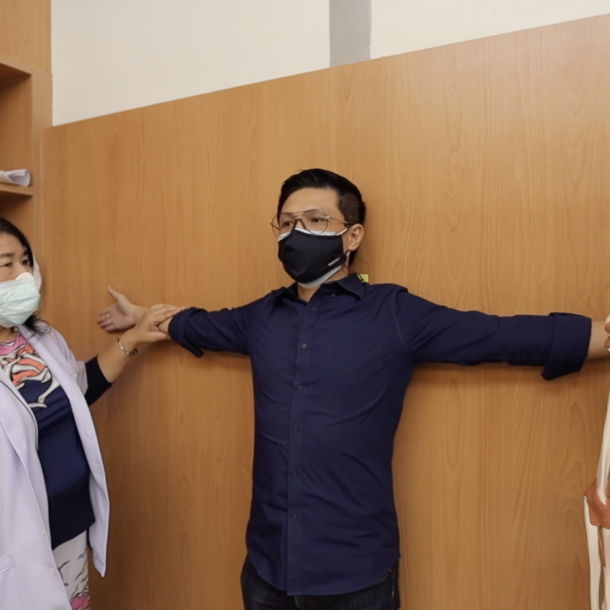
10 mindful minutes เราเคยไหมที่ใช้เวลาสั้นๆ เพียงแค่ 10 นาที ในแต่ละวันให้กับตัวเอง ด้วยการอยู่นิ่งๆ โดยไม่คิดอะไร หรือ ไม่ทำอะไรเลย
เราใช้ชีวิตอยู่ในโลกที่ทุกอย่างเข้ามาและผ่านไปด้วยความรวดเร็ว โลกแห่งความวุ่นวายที่การดำเนินชีวิตเป็นการแข่งขันเหมือนรายการทีวีที่ให้แขกรับเชิญมาเอาตัวรอดโดยผ่านด่านต่างๆ เพื่อรับรางวัลในตอนจบ (ถ้ารอดไปได้นะ)
เราใช้ชีวิตในรูปแบบนี้กันมาจนมันกลายเป็นเรื่องปกติ ทั้งที่มันไม่ใช่เรื่องปกติเลยสักนิด เราละทิ้งช่วงเวลาพักหายใจ เวลาส่วนใหญ่ของเราเต็มไปด้วยความยุ่งยากที่ทำเพื่ออนาคต และความฟุ้งซ่านที่พลาดในอดีต แล้วเวลาไหนกันที่เราจะได้มีโอกาสอยู่กับปัจจุบัน
“การอยู่นิ่งๆ โดยไม่ทำอะไรเลย หมายถึง ไม่มีการรับส่งข้อความ ไม่มีอินเทอร์เน็ต ไม่มีทีวี ไม่มีการพูดคุยรวมถึงไม่มีการนึกย้อนถึงอดีต หรือ คิดเผื่อถึงอนาคตด้วย”
ในงาน TEDSalon London Fall 2012 Andy Puddicombe ขอให้ผู้เข้าร่วมฟังการบรรยายของเขา โดยให้ทุกคนคิดย้อนกลับไปดูว่าครั้งสุดท้ายที่คุณนั่งเฉยๆโดยไม่ทำอะไรเลย มันเกิดขึ้นตอนไหนกัน ลองใช้เวลาสัก 10 นาที ที่ไม่คิดอะไร ไม่ทำอะไร ไม่มีอะไรรบกวน มันเคยเกิดขึ้นหรือเปล่า?
“จิตใจ คือ สิ่งล้ำค่า แต่เรากลับไม่เคยใช้เวลาเพื่อดูแลมัน”
เหตุการณ์ต่างๆ ที่ไหลผ่านเข้ามาในชีวิตของเรา ล้วนส่งผลต่อจิตใจ ถูกจัดหมวดหมู่เพื่อเก็บไว้เป็นความทรงจำหรือประสบการณ์ตามที่จิตใจต้องการ ไม่ว่าจะเป็นความสุข ความเศร้า ความตื่นเต้น ดีใจ หรือแม้แต่เรื่องของอารมณ์ที่เกิดจากการรักใครสักคน เราล้วนใช้จิตใจสร้างความรู้สึกเหล่านั้นเอาไว้ แต่ถ้าดูจริงๆ แล้วเราใช้จิตใจของเราบ่อยกว่าการใช้รถ โต๊ะทำงาน หรือ คอมพิวเตอร์เสียอีก แต่ทำไมเราถึงมีเวลาดูแลสิ่งของเหล่านั้น แต่เรากลับไม่มีเวลาดูแลจิตใจตัวเอง
“เมื่อเราเกิดอาการเครียด จิตใจของเราจะวนเวียนเหมือนเครื่องซักผ้า”
ในตอนที่เราเครียด จิตใจของเราจะถูกผูกเอาไว้กลับเรื่องเครียดเรื่องนั้น มันจะวนเวียนอยู่ในหัวของเราไม่หยุด เป็นเรื่องยากที่จะปฏิเสธเรื่องเครียดออกไป เพราะเมื่อคุณผลักมันออก จิตใจของคุณจะดึงมันเข้ามาอีกรอบเสมอ เราทุกคนจมอยู่ในความเครียดที่เกิดขึ้นโดยไม่รู้วิธีจัดการกับมัน
“เรามีชีวิตอยู่บนโลกก็ไม่นาน แต่เราใช้เวลาเกือบครึ่งของชีวิตไปกับการฟุ้งซ่าน”
จากงานวิจัยของมหาวิทยาลัยฮาร์วาร์ดพบว่า มนุษย์เสียเวลาไปกว่า 47% ของแต่ละวัน หมดไปกับการคิด ไม่ว่าจะเป็นการคิดถึงเรื่องที่ผ่านไปแล้วในอดีต หรือคิดถึงเรื่องที่ยังไม่ได้เกิดขึ้น ซึ่งอาจจะเกิดหรือไม่เกิดขึ้นในอนาคต ซึ่งเรื่องเหล่านี้เป็นเรื่องที่ทำให้เราไม่มีความสุข แต่เราก็ยังหยุดความคิดกับเรื่องเหล่านั้นไม่ได้ และปล่อยพฤติกรรมเหล่านี้ให้มันกลายเป็นเรื่องปกติ
Andy เล่าว่า เขาได้มีโอกาสเข้าเรียนการทำสมาธิ เพราะแม่ของเขาพูดถึงเรื่องนี้ จนทำให้เขารู้สึกสนใจขึ้นมา ในสมัยยังเด็กเขาดูหนังแนวกังฟูและเคยคิดไปว่า ถ้าทำสมาธิอาจจะทำให้เขาบินได้แบบในหนัง เขาจึงตกลงเข้าเรียนเป็นเพื่อนแม่ และก็ไม่เกินที่ทุกคนจินตนาการไว้ เขาจุดธูป นั่งขุดสมาธิบนพื้น กินชาสมุนไพร และกินมังสวิรัติ
“เมื่อฉันผลักมันออกไปได้ 1 อัน อีกอันก็ปรากฏขึ้นอย่างไม่รู้จบ”
เมื่อ Andy อายุเข้า 20 ปี มีสิ่งเกิดขึ้นมากมาย ซึ่งเดาได้เลยว่ามันไม่ใช่สิ่งที่ดีหนัก ชีวิตของความพลิกผันจากหน้ามือเป็นหลังมือ เราถูกดึงให้จมดิ่งสู่ห้วงความคิดอย่างช่วยไม่ได้ และเขาไม่รู้วิธีหลุดออกมาจากตรงนั้นเสียด้วย เมื่อเขาพยายามตะเกียกตะกายตัวเองขึ้นมาจากความคิดเลวร้ายเรื่องหนึ่ง อีกความคิดร้ายอีกเรื่องหนึ่งก็ดึงเขาลงไปจนจมลงไปอีกครั้ง และเหตุการณ์แบบนี้มันเกิดขึ้นเสมอกับชีวิตของเขาในช่วงเวลาดังกล่าว
“มนุษย์เราต่างมีวิธีจัดการความเครียดที่แตกต่างกัน”
เมื่อเกิดความเครียดขึ้นอย่างช่วยไม่ได้ บางคนอาจจะเรื่องทำตัวเองให้ยุ่งอยู่เสมอเพื่อหนีจากความฟุ้นซ่านตรงนั้น บางคนไปหาเพื่อนหรือครอบครัวเพราะต้องการแรงสนับสนุนจากใครสักคนให้ผ่านเรื่องตรงนี้ไป บางคนเลือกที่จะดื่มเหล้า หรือ เลือกที่จะไปหาหมอ แต่สิ่งที่ Andy เลือกทำ ก็คือ การบวชพระ แล้วเริ่มศึกษาการทำสมาธิอย่างจริงจัง
“มนุษย์เราต้องเข้าใจในช่วงเวลาปัจจุบัน”
การบวชพระทำให้เขาได้เข้าใจหลายสิ่งอย่างชัดเจน หนึ่งสิ่งที่เขารู้สึกดีใจมากที่สุดที่ได้เรียนรู้ก็คือการทำความเข้าใจต่อเหตุการณ์ที่กำลังเกิดขึ้นอยู่ในปัจจุบัน ซึ่งหมายถึงการไม่เผลอคิดไปถึงช่วงเวลาในอดีตที่เราเข้าไปทำอะไรกับมันไม่ได้แล้ว หรือ ไม่วิตกกังวลถึงอนาคตที่ยังมาไม่ถึง เป็นเพียงการคิดถึงตรงนี้และตอนนี้เท่านั้น หรือเรียกอีกอย่างว่าการมีสติอยู่ในปัจจุบันนั้นเอง
“มนุษย์เราตีราคาช่วงเวลาปัจจุบันต่ำเกินไป”
เพราะการมัวคิดถึงช่วงเวลาอดีตหรืออนาคต ทำให้เราสูญเสียช่วงเวลาในปัจจุบันไปอย่างน่าเสียดาย เรามักมองข้ามมูลค่าความเป็นปัจจุบันกันอยู่ทุกวัน แต่สิ่งที่ยากก็คือ การบังคับจิตใจของเราเป็นเรื่องไม่ง่ายเลย
เมื่อเราบอกว่าอย่าสนใจอดีตนะ สนใจแค่ปัจจุบันพอ เราจะสั่งจิตใจให้สนใจแค่ปัจจุบันจนมันมากเกินไป เมื่อมากไปจนล้น ชีวิตของเราก็จะอึดอัดเหลือเกิน คงรู้สึกหายใจไม่ค่อยสะดวกเท่าไรในแต่ละวัน ในทางกลับกัน ถ้าหากเราทำสมาธิมากไป เราก็อาจจะง่วงจนถึงขั้นหลับได้ เพราะฉะนั้นเราจึงต้องการตรงกลาง สายกลาง ที่สามารถบาลานซ์ชีวิตของเราให้เกิดความลงตัว
“การถอยหลังออกมาสักนิด แล้วมองทุกอย่างดำเนินไปอย่างที่มันเป็นโดยไม่แต่งเติมอะไรเข้าไป”
หลังจากช่วงเวลาที่ยากลำบาก ไม่ว่าวันนั้นจะเป็นวันที่แย่ขนาดไหน ขอให้เราลองถอยหลังมาตั้งหลักกับตัวเอง มองทุกอย่างเข้ามาและผ่านไปในปัจจุบัน อย่าคิดเผื่อถึงอนาคต หรือนึกย้อนถึงอดีตของมัน อย่าปรุงแต่งอะไรเข้าไป
“เหตุที่เรามักกังวล ก็เพราะความรู้สึกกังวลของเรานั่นเอง”
หลังจากผ่านการเรียนสมาธิมา สิ่งที่ Andy ได้ค้นพบก็คือ การจบอยู่กับความคิดฟุ้งซ่านเหล่านั้น มันคือความรู้สึกวิตกกังวลในบางสิ่ง หรือ อาจจะทุกสิ่ง เราคิดว่าทุกอย่างจะผ่านไปได้ด้วยดี ไม่ได้รู้สึกตัวเลยสักนิดว่ากำลังกังวล ความคิดนี้จะวนไปเรื่อยๆ เหมือนเครื่องซักผ้า จนกระทั่งเราตบหน้าตัวเองหนึ่งทีแล้วเพิ่งรู้ว่าเรากำลังกังวลอยู่ และเรากังวลก็เพราะเราไม่อยากรู้สึกกังวล
ข่าวดีก็คือ ปัญหาเรื่องนี้มีทางแก้ มีบางอย่าง บางวิธีการที่เราสามารถทำได้ เป็นการจมอยู่เชิงบวก ซึ่งทำได้จริง ได้ผลจริง วิทยาศาสตร์พิสูจน์มาแล้ว และมันยังส่งผลดีต่อช่วงเวลาในปัจจุบันด้วย
“เพียงแค่ 10 นาทีต่อวัน แต่ส่งผลดีต่อชีวิตของเราทั้งชีวิต”
องค์ประกอบสำคัญของการทำให้ 10 นาที คุ้มค่ามากที่สุด ก็คือ เราต้องคุ้นเคยกับตัวเราในช่วงเวลาของปัจจุบัน ภายใน 10 นาทีนั้น จะเป็นการถอยหลังเพื่อจดจ่อกับปัจจุบัน ลึกเข้าไปภายในจิตใจตอนนั้นให้ชัดเจนที่สุด เราจะพบกับแบบแผนภายในจิตใจของเราที่มันวนอยู่ในเส้นทางเดิมมาตลอด มันอาจจะดูอ่อนล้า ไม่สงบ ชินชากับปัจจุบันที่กำลังดำเนินไป หรือเบื่อโลกเต็มทน แต่ทั้งหมดนั้นล้วนเป็นกลไกลทางจิตใจที่เกิดขึ้น แต่เมื่อเราค้นพบมัน นี่อาจจะเป็นครั้งแรกที่แบบแผนภายในจิตใจของเราได้เปลี่ยนเส้นทางไปบ้างแล้ว
บทสรุป
จิตใจของเราที่ใช้อยู่ทุกวันนี้ ยังแข็งแรงดีหรือเปล่า? มันได้รู้สึกเหนื่อยล้าหรือหมดแรงกับสิ่งต่างๆ ที่เข้ามาและผ่านออกไปบ้างหรือเปล่า? มันยังยึดติดอยู่ในอดีตที่ผิดพลาด หรืออนาคตที่คาดหวังไหม?
ลองใช้เวลาเพียงแค่ 10 นาทีต่อวัน สำหรับการมีสติและใช้สมาธิดูแลรักษาจิตใจของเรา เพราะ 10 นาทีนี้ เป็นเวลาที่น้อยกว่าการล้างรถหรือล้างขยะในคอมพิวเตอร์เสียอีก แต่ผลลัพธ์ที่ได้จากเพียงแค่ 10 นาทีนี้มันมหาศาล
เมื่ออ่านถึงตรงนี้ มันขึ้นอยู่กับตัวเราแล้วว่า เราจะสามารถเปลี่ยนเส้นทางแบบแผนในจิตใจเราได้แค่ไหน การเปลี่ยนแปลงนั้นมันจะให้อะไรกับเราได้บ้าง แต่ที่แน่นอนเลยก็คือ เราจะได้พบกับหนทางแห่งการเยียวจิตใจที่ไม่ต้องพึ่งยาชนิดใดๆ บนโลก และ ในที่สุดเราก็จะเข้าใจว่า …
“เราไม่อาจเปลี่ยนแปลงทุกเรื่องราว ที่เกิดขึ้นในชีวิตของเราได้ แต่เราเปลี่ยนประสบการณ์ชีวิตเราได้ สมาธิช่วยเราได้ สติช่วยเราได้”
All it takes is 10 mindful minutes | Andy Puddicombe
บทความแนะนำ : ควบคุมจิตใจคนอื่น ได้ไม่ยากด้วย 10 วิธี ง่ายๆ ตามหลักจิตวิทยา





